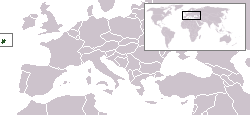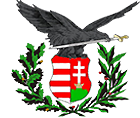Liberty Islands
From Ipon
| |||||||
| Motto: '"Szabadság, Egyenlőség, Jólét"' | |||||||

| |||||||
| {{{CJlink}}} | |||||||
| Capital | Szabadrév
(Freeport, Freihafen, Vrijhaven) | ||||||
| Largest city | Szabadrév | ||||||
| Official language(s) | English / Hungarian | ||||||
| Government Governor-president
Prime Minister Foreign Minister | direct democracy Erika Boglárka Dunai Benedek Halászy | ||||||
| Republic Independence Constitution | 1849 1849 | ||||||
| Area • Total • Water (%) | 40,000 km² 160,000 sq km | ||||||
| Population • 2007 est. • 2006 census • Density | 2,000,000 () 2,023,945 /km² () | ||||||
| GDP (PPP) • Total • Per capita | $100.00billion $50,000 | ||||||
| HDI | 0.960 | ||||||
| Currency | Független Forint
/ Independent Forint ( | ||||||
| Time zone • Summer (DST) | Atlantic Standard Time (UTC-1) -1 (UTC0) | ||||||
| Internet TLD | .li | ||||||
| Calling code | +919
| ||||||
Liberty Islands The Liberty Islands (Hungarian: Szabadság-szigetek; German: Freiheitinseln; Dutch: Vrijheideilanden; Russian: Острова Свободы) is located on the Norhtern hemisphere, on the Norhtern Atlantic Ocean, midway between the British Isles and the North American continent. It consists of two larger (Norhtern and Southern) and many smaller islands. Its capital is Szabadrév. Liberty Islands is the member of IPON. The mother-tongue is Hungarian, part of the Finno-Ugric family, however lot of other nationalites use their own language and English is very common even in government. Besides the Hungarian majority, many Dutch, German, British and Russian live in Liberty Islands. Liberty Islands is one of the most developed countries of the world, similar to Singapore and Switzerland.
Contents |
History
Early times
It is said, but not proved that Liberty Islands was first discovered by the nordic vikings, while they went out on a discovering trip from the British Isles. Due to the proximity of the islands from the closest large landmass, most of the historians and archeologist believe that vikings weren't even able to travel that far on very open seas. Supporting the later mentioned theory no proved viking remains were found.
Until the exploration of America, no signs were recorded by traders or sails that they discovered the islands. After the European powers started regular Transatlantic ship routes there are records of a mysterious green land that sailors saw on the Atlantic while they were in the middle of the Atlantic. Liberty Islands slowly bacame a legend among sailors and traders. Legend because no one could register the exact location of the islands, and sometimes they couldn't even saw it due to the stormy or foggy weather. The another reasone why didn't any of the crew of those ships didn't discover this islands is that Liberty Islands didn't have any seagull population that could show clear signs of existing lands. Because of this, the exploration of the islands was accidental.
Exploration
The Austrian Empire rarely sent any ships to the Atlantic, as it costed too much travelling from the Adriatic Sea to the Mediterranean and to the Atlantic. Maria Theresa, the Empress of Austria decided help her ally and send troops by sea to North America where the French and Indian War were happening. This was during the Seven Years' War. The British Empire were informed about this and prepared to stop the Austrian ships at the Strait of Giblaltar, but they were late and couldn't catch the ships, then they followed them on the shores of Spain and on the middle of the Atlantic, but could catch up to fight them over. While this race the Austrian ships had to go norther and norhther (due to the actual course of the wind). During a tough storm the Austrian ships had the chance to escape their chasers and the British captains didn't risk to go after them. While the storm, the Austrian ships accidentally explored the Liberty Islands. 3 of the ships had sunk during the storm, but the 2 survivor could anchor at the shores of the islands and the Hungarian troops (the shores of Adriatic Sea was part of Croatia and by this, part of Hungary; so the Austrian navy basicly consisted of newly conscripted Hungarians) on the Austrian ships landed on the islands and they become the first men to see the islands. They were able to keep their secret as the British tought all of the 5 ships went under and discontinoued their efforts to catch the Austrian ships. Months later the new inhabitants of the the islands sent back one of the ships with the news, they luckly landed in France and could go back to the Austrian Empire to tell the great news. The Empress and the government didn't belive the stories, but a few of her Hungarian advisors finally had her promise to send more ships with Hungarian crew to the islands. The few dozen of the sailors and troops that were left on the islands survived until the new ships arrived. After more and more people recieved news about this, the British, the French, and the Dutch also sent forces to the Liberty Islands.
Colonisation | 1760s - 1800
Independence | 1800s
1849 - 1920
1920 - 1945
1945 - present
Politics
Government structure
Legislative branch
- House of Representatives
- Senate
- Chamber of Deputies
Executive branch
- Governor-president
- Prime Minister
- Cabinet
- Minstries
Judical branch
- Supreme Court
- High Court
- District Court
- Attorney General
Foreign relations
Hungary
IPON member states
Republic of Mesías
Republic of Sakhaliya
Hindu Republic of Jansipur
State of Nemonos
Emirate of Khaled
State of Canatlán
Qumma
Kingdom of St. Marque Inlet
Kingdom of Ruritania
Georgiapolis
West End
Severnaya
Green Depra
Economy
Liberty Islands is one of the most developed countries of the world, similar to Singapore and Switzerland. It has a highly developed free market-based economy, which historically revolves around extended entrepot trade. Liberty Islands has one of the busiest ports in the world. It is the world's fifth largest foreign exchange trading centre after London, New York City, Tokyo and Singapore. The country has been rated as one of the most business-friendly economies in the world, with thousands of foreign multi-national corporations. Due to taxation regulations and the neutrality many multi-national financing and trading corporation maintain secondary headquarters in the country.
Trade
Technology and research
Human resources and education
Energy
Military
- Military Intelligence
- Air Force
- Airborne Troops
- Navy
- Marines
- National Guard


